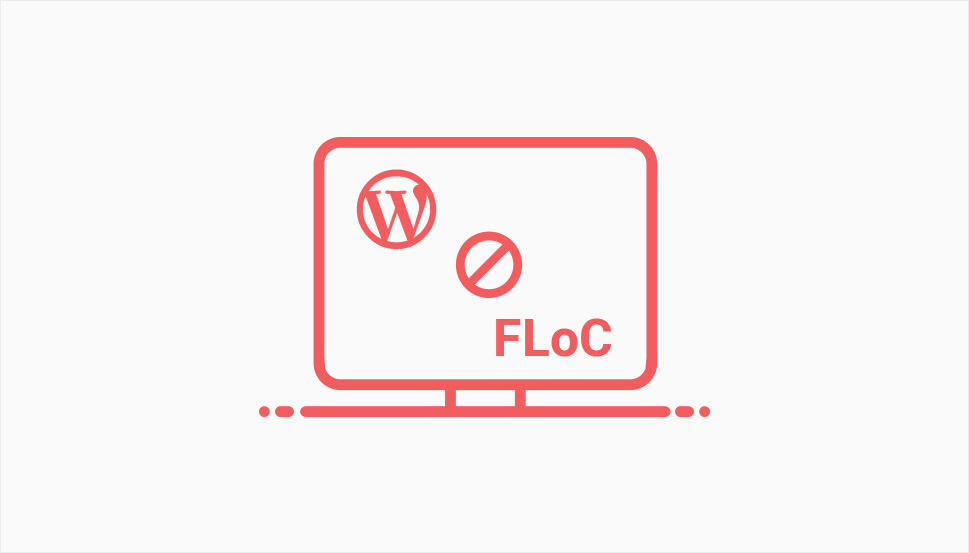FLoC and WordPress – Everything You Need to Know

You might not be aware of it when you first start using WordPress, but the moment your WordPress website goes online, you become a part of a large community. You could be using WordPress for affiliate marketing, your very own WooCommerce store, or to start a fashion blog – it doesn’t matter. When you have a website, you become responsible for keeping it safe and secure for your visitors, and that often means looking for signals from the core CMS developer.
The question of Google’s FLoC – Federated Learning of Cohorts – and its security implications have been discussed within the WordPress community and beyond. In case you’ve heard about this Google-developed substitute for third-party cookies, but you’re not sure what to make of it, don’t worry. We’ll try to get you up to date on the topic as soon as possible.
In this article, you’ll learn about:

The story about FLoC, WordPress, and how it affects everyone’s online activity starts with the deliciously named cookie – a small file nestled in the browser containing some useful information. Cookies help YouTube recommend videos to you, and keep the shopping cart in an online store you visit consistent while you browse around. Useful little things, those cookies.
Some of them indeed are. But others don’t help you as much as they help people who want to sell stuff to you. Those useful cookies, the ones that let websites have all those nice features like cart permanence and the ability to stay logged in, are first-party cookies. The websites you visit create them and place them on your computer.
The bad cookies, the ones that show you ads about the things you’ve searched for online just hours ago, are third-party cookies. They aren’t created by the website you’re visiting, but by advertisers who use them to gather a lot of information about you and your online activity. As you browse the web, these cookies interact with trackers to collect data points, which are then used to serve ads to you.
While you might have some control over whether you want this data to be collected or not, the routine invasion of privacy that comes with third-party cookies and the possibility for security issues were big enough to put third-party cookies on the watchlist of many different organizations.
Governments are looking into them, with the EU leading the charge. Privacy advocates and researchers have been even more vocal. Companies such as Apple and foundations such as Mozilla have enabled third-party cookie blocking in their web browser, too. In 2019, Google decided to join in on the effort.

When it comes to tracking, displaying ads, and browsers, Google has a unique position because it, or its parent company, has its fingers in all of the above. Google dominates the browser market with Chrome. It dominates the digital advertising market with Google Ads. Thanks to its search engine it always has places to display ads, and it can gather data points on its users like very few other companies – or maybe even none other.
Still, Google decided that it, too, will have to start taking privacy seriously. It announced its Privacy Sandbox initiative to create solutions for a more private web while simultaneously probably making sure advertisers are happy and targeting is still a thing. That’s what Federated Learning of Cohorts was supposed to do, anyway – give advertisers a way to target you without identifying you.
With FLoC, advertisers would see you as part of an interest-based cohort. Your browser would distill the information it gathers about your activity – no need for cookies, see – and then produce a tag that would tell advertisers which cohort it belongs to. They would then use that information to display ads relevant to the cohort.

FLoC wasn’t well-received by the organizations dealing with privacy, information rights, and cyberspace. Many of those who were critical of third-party cookies didn’t see FLoC as the type of moving forward that was needed. Among the organizations that published criticism of FLoC were Mozilla, the Electronic Frontier Foundation, as well as browser developers such as Brave and DuckDuckGo.
Google’s attempt at third-party cookie replacement was met with scorn for a good reason. FLoC failed to provide a safe alternative to third-party cookies, itself being either susceptible or conducive to all sorts of privacy and security concerns. One of the greatest concerns noticed by security researchers was the fact that FLoC made some security threats worse. Fingerprinting, or using disparate data points to create a stable identifier for a browser, might be aided by FLoC.
That’s just the beginning, though. Other concerns raised against FLoC include insufficient countermeasures, gathering and leaking too much user data, too narrow cohort targeting. Google has gone so far as to eventually recognize the fingerprinting danger and start looking into a topic-centered way of tracking users and delivering ads and has eventually decided to postpone Chrome’s third-party cookie abolishment until 2023.

FLoC affects WordPress users as much as any other CMS or website builder user. Still, because WordPress is the leader of the CMS market with a bustling community – it’s an institution of open-source software and the web – any reaction that came from its camp was sure to be noted.
That’s exactly what happened when there was a call for WordPress to start treating FLoC as a security threat. It was later announced that, for the time being, WordPress will not be doing that. With the future of FLoC still being uncertain, it’s still to be seen whether it eventually will. The very fact that such a conversation happened only served to show Google that it’s not on the best path with FLoC.

As someone who uses WordPress, you don’t have to pay too much attention to FLoC for now. It’s yet to be seen what changes Google will make with it, and what replacement for third-party ads it will come up with.
One thing’s for sure, though – online tracking is going to change. The real question is whether that affects your business model or not, and how easily you and your website can adapt to a tracking-free future. If that’s what we’ll see, of course – Google doesn’t have to take anyone’s opinions into account when making any decisions about FLoC. It’s at the top of too many markets with competitors not even close.



